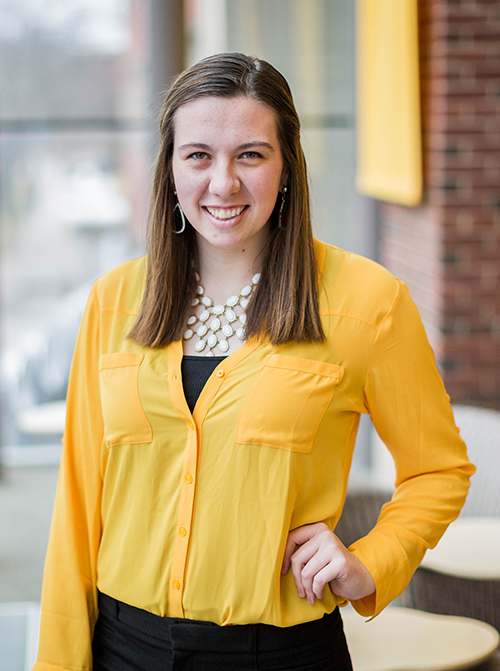
Angie Benda, Undergraduate student, Psychology and Political Science
Evaluates driver readiness
• Hometown: Sun Prairie, Wisconsin
• Faculty mentor/advisor: Elizabeth O’Neal, Postdoctoral Research Scholar, Psychological and Brain Sciences
• What is your degree program and expected graduate date? Psychology and Political Science; Expected graduation: Fall 2019
• Please describe your research: My research looks at the effectiveness of computer training programs designed to help teenage drivers identify road hazards. Specifically, hazards that teen drivers do not necessarily have experience with, such as noticing when there is a truck blocking an intersection, creating an obstructed view. Overall, it is the goal that these training programs will help teens to become safer drivers.
• In simple terms, why does this research matter? Understanding how training programs can help novice drivers perceive and adapt to road hazards (e.g. a deer crossing the road) is important to research because the leading cause of death among teens, is motor vehicle accidents. Therefore, if these training programs do help teens to notice road hazards, then they can potentially be implemented into driver’s education programs, and help to reduce the number of teen driving motor vehicle accidents.
• How soon after starting at the University of Iowa were you able to participate in research? I was able to start getting involved in research as a participant my first year on campus. I was able to be a research assistant starting my Junior year of school.
• How has being involved in research made you more successful at the University of Iowa? Being involved in research has made me more successful at Iowa because it has taught me how to think like a researcher. Sitting in my first lab meeting I learned how to critically ask questions about research in order to make it stronger. Participating in research has allowed me to connect what I am learning in my classes, like Research Methods, and apply it to real-world research that is being conducted.
• What are your career goals and/or plans after graduation? My career goals are to eventually become a professor of psychology and to continue to do research. After graduation I plan to continue working on the current research projects I am involved with now and to apply to graduate school! I am also determined to be an advocate for psychological research to be utilized more frequently at the governmental level when it comes to making policy decisions.
Banner location: not on display—
